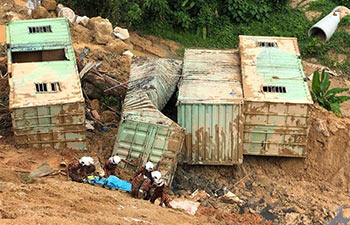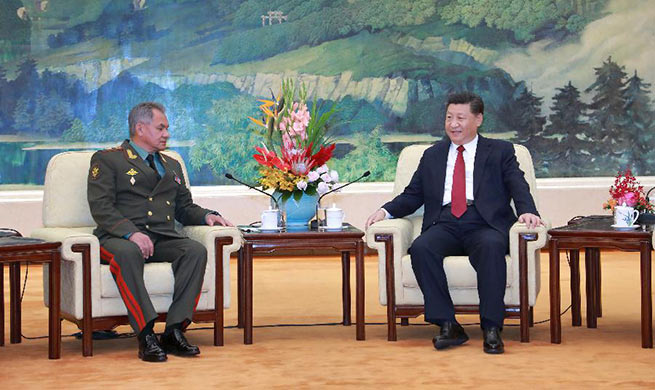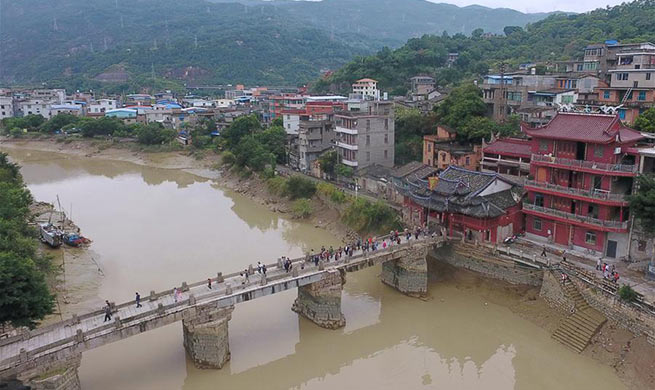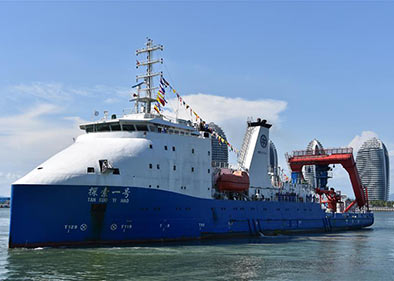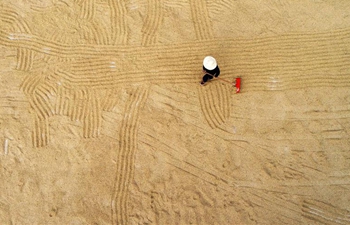ANKARA, Oct. 19 (Xinhua) -- Tension over natural gas and oil deposits in the sea off Cyprus is escalating, with Turkey's navy on Thursday stopping a Greek frigate from interfering with a Turkish seismic ship in the Mediterranean.
Turkey's Barbaros Hayreddin Pasa vessel started a new seismic research activity on the Turkish continental shelf in the Mediterranean on Thursday morning, said the Turkish Foreign Ministry in a written statement.
The ministry called on Greece to "abstain from acts that would cause an escalation in the region."
One day earlier, the Greek Ministry of Foreign Affairs said in a statement that the drilling research activity of Turkish ship was "provocation" and "illegal."
Ankara had issued a notification to inform that its ship would be conducting seismic surveys in the Mediterranean Sea from Oct. 18 to Feb. 1, but Greek frigate Nikiforos Fokas interfered with Turkey's Barbaros ship, a Turkish official told Xinhua.
Turkish frigate TCG Giresun, which was already in the region to protect the seismic vessel, intercepted the Greek frigate.
Turkey later dispatched another frigate and a submarine to protect ship Barbaros, the official said on condition of anonymity.
The incident took place in the area claimed by Greek Cyprus for future hydrocarbons exploration.
Turkey and Greece have long disputed over claims of Greek and Turkish Cypriots for offshore oil and gas sources in the Mediterranean.
This is not the first escalation over research and drilling activities for natural resources around Cyprus Island.
Ankara has several times accused the Greek Cypriot of unilateral drilling activities in the eastern Mediterranean, on the grounds that Turkish Cypriots also have rights on those resources.
Turkey suggests that a peace deal must come first in Cyprus before international companies can start exploring for energy sources.
Cyprus was divided into a Turkish Cypriot state in the north and a Greek Cypriot administration in the south after an 1974 military coup. The status of the island remains unresolved in spite of several reunification talks carried on between Turkish and Greek Cypriots under auspices of the UN.
Greek Cyprus has pushed ahead with exploring offshore after the latest talks to end the Mediterranean island's de facto partition failed in 2017.
It signed maritime demarcation agreements with its neighbors Egypt and Israel in a bid to export the gas to Europe via an undersea pipeline to Greece.
Most recently, Greek Cypriot Minister of Energy Yiorgos Lakkotrypis and Egypt's Oil Minister Tarek El-Molla signed an agreement in September for construction of a sub-sea pipeline to export natural gas from the Cyprus island to Egypt.
As a guarantor country for the Cyprus island, Turkey has increased its presence in the Mediterranean Sea with its seismic and drilling vessels as well as its navy.
Turkish warships imposed in several incidents a blockade of drilling ships contracted by Greek Cyprus.
Turkish Foreign Ministry advised companies that might be interested in participating in a tender with Greek Cyprus "to act with common sense and to duly consider the realities on the ground."
In February, a drill ship contracted by Italian oil and gas giant ENI to explore in Cyprus' offshore abandoned its mission after Turkish navy blocked its path.
This tension is likely to continue in the upcoming days on military, diplomatic and political grounds, said Serkan Demirtas, columnist of Hurriyet Daily News and an expert on foreign relations of Turkey.
According to Turkish Energy Minister, Turkey's first drilling vessel Fatih will initiate drilling operations in the Mediterranean by the end of this month.
Turkey aims to broaden its deep-sea and land exploration as well as drilling operations for oil and gas as part of its National Energy and Mining Policy, which was announced in April 2017, in order to decrease its dependency on energy import.
"Greek Cypriots are increasing its efforts to explore and drill hydrocarbon reserves off the island involving some international energy companies, such as ENI, Total and Nobel Energy so that they try to turn the dispute into an international issue," Demirtas said.
According to Demirtas, Greek Cyprus issued a complaint to the European Union that the Turkish military had obstructed natural gas prospecting off the coast of the divided island after ENI's drillship Saipem 12000 was stopped on Feb. 9 by Turkish military ships.
"They tried to drive a wedge between Turkey and the EU over the issue of gas exploration in the region," he noted.
